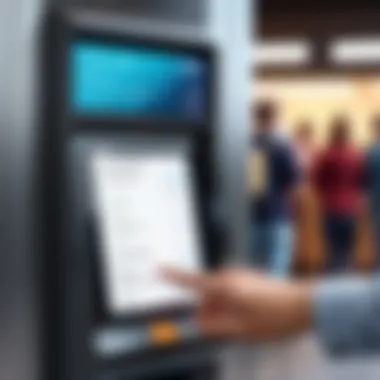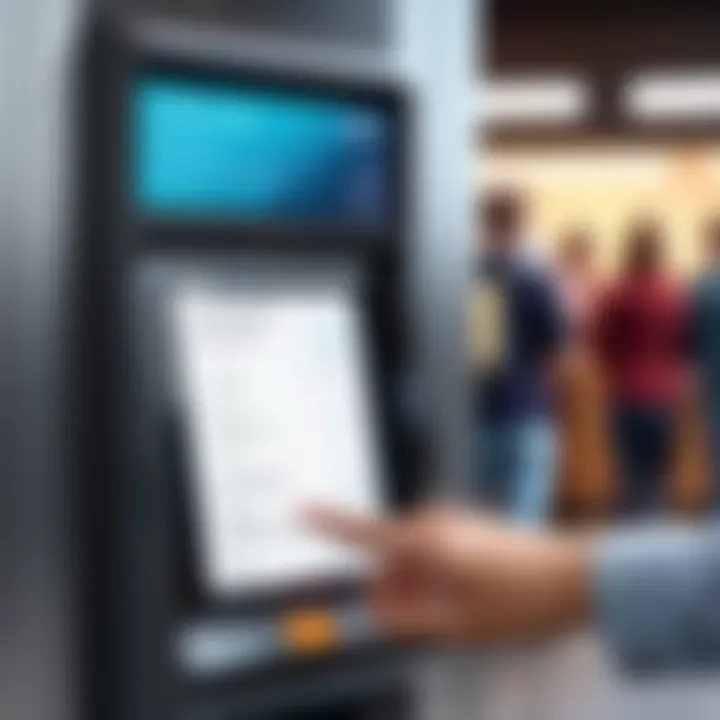Comprehensive Overview of Festival Ticketing Systems


Intro
Festival ticketing systems play a crucial role in the smooth execution of events, enabling organizers to manage entry effectively while providing a seamless experience for attendees. Understanding the landscape of these systems is essential for decision-makers, IT professionals, and entrepreneurs who seek to optimize ticket sales and event management. This article aims to provide a comprehensive exploration of various ticketing platforms, addressing key features, challenges, and trends within the industry.
The rising demand for live events underscores the importance of robust ticketing solutions. Given the diverse types of festivals, from music and arts to food and cultural gatherings, each event presents unique requirements. Therefore, grasping the nuances of ticketing systems becomes imperative for stakeholders looking to enhance operational efficiency and customer satisfaction.
In the following sections, we will examine the underlying technology that powers ticketing platforms, delve into their features, and compare various systems to highlight their strengths and limitations. By synthesizing this information, we aim to equip industry professionals with actionable insights tailored to specific festival needs.
Intro to Festival Ticketing Systems
The landscape of event management has evolved significantly in recent years, and festival ticketing systems have emerged as a crucial component within this change. With the rise of digital solutions, these systems hold the potential to streamline event operations, enhance attendee experience, and generate valuable insights for decision-makers. In this article, we will unravel various aspects of festival ticketing systems that are essential for effective event management.
Definition and Purpose
The essence of a festival ticketing system can be defined as a platform or software that helps manage ticket sales and distribution for events, particularly festivals. These systems serve multiple purposes, including:
- Ticket sales management: This encompasses the entire process from ticket creation to sales tracking.
- Access control: Ensuring that only valid ticket holders can enter the venue.
- Data collection: Gathering valuable information about customer preferences and behaviors, which can inform future marketing strategies.
In recent years, the importance of these systems has increased as they allow event organizers to focus on enhancing customer relations and improving overall operational efficiency.
Importance in Event Management
The significance of festival ticketing systems in event management is multifaceted. By implementing robust ticketing solutions, event managers can achieve the following benefits:
- Operational efficiency: Automating ticket sales reduces manual tasks, minimizing human error and saving time.
- Enhanced user experience: A user-friendly interface and streamlined purchase process can attract more attendees.
- Churn reduction: Systems that facilitate easy access to tickets and offer loyalty programs can foster customer retention.
- Revenue maximization: Features such as dynamic pricing can help in optimizing revenue based on demand.
"Effective ticketing systems do not just sell tickets; they create memorable experiences for attendees and valuable data for organizers."
Types of Ticketing Systems
Understanding the types of ticketing systems is crucial as it lays the foundation for effective event management. Various systems cater to distinct audience needs and pricing models. Each category has its advantages, and selecting the right one impacts revenue generation, attendee experience, and operational efficiency.
General Admission Ticketing
General admission ticketing is straightforward and widely applicable. It allows attendees to enter events without reserved seats, creating a more casual environment. This method is often cost-effective and easy to manage, making it suitable for smaller festivals or venues. Attendees simply purchase tickets, usually at a flat rate, and gain access on a first-come, first-served basis. The simplicity of this approach often leads to faster sales, appealing to a broader audience.
This system empowers organizers to maximize ticket sales without the complexity of premium seating arrangements. Furthermore, it enables spontaneous attendance, which can enhance a festival's atmosphere. However, it may lead to overcrowding in popular areas or during peak times.
VIP and Premium Ticketing
In contrast, VIP and premium ticketing caters to those seeking an elevated experience. This system typically includes additional perks such as priority entry, exclusive access to certain areas, complimentary drinks, or dedicated seating. By offering these incentives, event organizers can generate higher revenue per ticket sold, appealing to a demographic willing to pay more for comfort and exclusivity.
It's essential for organizers to carefully plan these VIP offerings to ensure they meet the expectations of attendees. If marketed effectively, this can elevate the overall perception of the event. Common examples include music festivals where VIP packages may include access to backstage areas, meet-and-greet opportunities with artists, and premium viewing spots. However, organizers must manage these sections carefully to maintain a positive experience for all attendees.
Dynamic Pricing Models
Dynamic pricing models introduce a sophisticated approach to ticket sales. This method adjusts ticket prices based on demand, time of purchase, and remaining availability. It allows organizers to optimize revenue by charging higher prices when demand is high and providing discounts as the event date approaches, if tickets remain unsold.
This system demands robust data analytics and forecasting to implement correctly. By analyzing previous sales patterns and attendee behavior, organizers can predict trends and adjust pricing accordingly. Dynamic pricing can boost overall revenue but which can also frustrate some customers who observe rapid price fluctuations. Transparency about pricing changes is crucial to maintain trust with potential attendees.
"Dynamic pricing can significantly increase revenue for festivals, but understanding customer perception is key to its success."
Key Features of Effective Ticketing Systems
The efficiency of festival ticketing systems relies heavily on their key features. A well-designed ticketing system should prioritize usability and adaptability. These features enhance the user experience and streamline the management of ticket sales, ensuring both customers and event organizers can navigate processes with ease. The following subsections delve into essential elements that can significantly impact operations and patron satisfaction in a festival environment.
User-Friendly Interface
A user-friendly interface is vital for any ticketing system. It plays a crucial role in defining the overall user experience. If users find it difficult to navigate the system, they may abandon their purchase, costing the festival both revenue and potential attendees. A clear layout, intuitive navigation tools, and easy access to information improve the chances of successful transactions.


Features such as large fonts, clear buttons, and streamlined forms help in reducing friction. Organizers should consider that first-time users often look for a seamless experience. This fact emphasizes the importance of designing interfaces that accommodate all user types.
Mobile Compatibility
In an increasingly mobile-centric world, having a mobile-compatible ticketing system is indispensable. More festival attendees are using smartphones to purchase tickets. A mobile-optimized site enhances accessibility, allowing users to buy tickets from anywhere. Notably, a responsive design adjusts automatically to different screen sizes, further ensuring that all users have a consistent experience.
Moreover, mobile compatibility can lead to impulse purchases. Potential attendees often decide last minute, so making ticket sales available on mobile devices can capture these opportunities effectively. As a result, having mobile-friendly ticketing can significantly boost overall sales.
Data Analytics and Reporting
Data analytics have emerged as significant aspects in the planning and execution of successful ticketing strategies. A sophisticated ticketing system should provide reliable data analytics and reporting features. These tools help organizers understand purchasing patterns, customer demographics, and overall performance metrics.
With access to detailed insights, event organizers can make informed decisions. For example, they can adjust pricing strategies based on demand or target specific customer segments with tailored marketing campaigns. Analysis of sales data enables organizers to optimize ticket inventory and enhance future events.
Integration with Payment Gateways
Payment processing is a critical element in any ticketing system. Smooth transactions hinge on robust integration with reputable payment gateways. This integration allows customers to pay conveniently using various methods such as credit cards, digital wallets, or mobile payments.
A reliable payment integration does not only focus on ease of use but also on security. Users need to trust that their payment information is securely handled. Hence, compliance with security standards like PCI DSS and employing encryption techniques are vital measures that enhance transaction security, which ultimately builds loyalty and confidence in the ticketing system.
Technological Factors in Ticketing Solutions
The rapid advancement in technology profoundly impacts festival ticketing systems. These advancements not only enhance operational efficiency but also improve the customer experience. Understanding these factors is crucial for anyone involved in event management or ticketing solutions.
Blockchain Technology in Ticketing
Blockchain technology has emerged as a transformative force in securing ticketing processes. Its decentralized nature allows for higher security against fraud. Each ticket generates a unique digital signature, verifying authenticity and preventing duplication. This technology also facilitates transparency between consumers and sellers, allowing for trust in secondary markets.
The benefits of using blockchain in ticketing include:
- Fraud Reduction: The use of smart contracts ensures that counterfeit tickets are nearly impossible.
- Decentralization: No single entity controls all transactions, minimizing risks of centralized failures.
- Transparency: Every ticket transaction is recorded, improving accountability.
Challenges do exist, however. Implementing blockchain requires substantial technical infrastructure and understanding, which may be daunting for some festival organizers. Yet, the potential long-term benefits make blockchain a worthy consideration.
Artificial Intelligence Applications
Artificial Intelligence (AI) can greatly enhance the efficiency of ticketing systems. AI tools can analyze consumer behavior to predict ticket sales patterns, thus informing pricing strategies and promotional efforts. This continuous learning allows for adjustments based on real-time data.
Some ways AI is applied in ticketing include:
- Dynamic Pricing: AI algorithms can adjust prices based on demand and market trends automatically.
- Customer Engagement: Automated chatbots can handle inquiries, providing quick responses to potential buyers.
- Fraud Detection: AI can monitor transactions and flag suspicious activities, reducing the risk of fraud.
Despite its perks, reliance on AI necessitates a careful approach. Data privacy concerns must be addressed to protect sensitive consumer information.
Cloud-Based Ticketing Solutions
Cloud computing has revolutionized how ticketing systems operate. Cloud-based solutions offer scalability, allowing festivals to adjust resources based on real-time needs. This flexibility is particularly beneficial during peak sales periods when demand spikes.
Advantages of using cloud-based systems include:
- Cost Effectiveness: Lower infrastructure and maintenance costs compared to traditional systems.
- Accessibility: Stakeholders can access data from anywhere, improving collaboration and response time.
- Seamless Updates: Software updates can be implemented easily, keeping the system efficient and secure.
However, the reliance on third-party cloud services raises questions about data security. Choosing reputable providers is essential to minimize risks.
"In the rapidly evolving landscape of event management, leveraging technology is not just an option; it is a necessity for success."
Challenges in Festival Ticketing
The landscape of festival ticketing is fraught with various challenges. Addressing these issues is crucial for the effective operation of ticketing systems. Understanding these challenges can help improve customer satisfaction and protect revenue. It allows festival organizers to strategize and enhance their ticketing methods. Each of the challenges present unique considerations.
Fraud and Scalping Issues


Fraud and scalping are significant concerns in festival ticketing. Fraudulent tickets undermine the integrity of the event and lead to financial losses. Scalpers buy tickets in bulk to resell them at inflated prices. This behavior alienates genuine fans who struggle to find affordable tickets. To combat these problems, organizations must implement robust verification systems. For instance, Ticketmaster has employed various measures including CAPTCHA and verified fan systems. These methods aim to ensure that tickets go to real attendees, not resellers.
Additionally, using blockchain technology can create a secure ledger for transactions. This technology can verify ticket authenticity and ownership, making it difficult for counterfeit tickets to enter the market. Developing trust with festival-goers is essential and addressing fraud can enhance this trust.
Technical Glitches and Downtime
Technical glitches can severely disrupt the ticket purchasing process. Even minor outages can lead to lost sales and frustrated customers. Festivals often face unexpected traffic surges that their platforms may not handle effectively. High-profile events like Coachella have had issues with their ticketing systems crashing due to overwhelming demand.
Organizers must ensure their ticketing systems are scalable and test their infrastructure well before sale dates. Using cloud-based solutions can help in managing traffic spikes. Companies like Eventbrite leverage cloud services to ensure they can provide adequate support during peak times. Regular maintenance and updates for ticketing software also reduce the likelihood of downtime.
Customer Service and Support
Effective customer service is pivotal in the ticketing sector. Customers may have questions or issues regarding their purchases, and their experiences can shape the overall perception of the festival. Providing timely support can prevent dissatisfaction and reduce negative feedback.
Organizations should invest in multi-channel support options. This can include chatbots for initial inquiries and live agents for complex issues. Companies like Live Nation benefit from a systematic approach that combines automated responses with human interaction. Additionally, having clear communication about policies and procedures helps in setting customer expectations, ultimately reducing the strain on support teams.
"Investing in technology ensures that challenges in ticketing systems can be managed proactively rather than reactively."
Emerging Trends in Ticketing Systems
Emerging trends in ticketing systems are reshaping how festivals manage admissions, enhancing user experiences, and creating new operational efficiencies. Understanding these trends is crucial for those involved in event management. The integration of evolving technologies and responsive strategies is a growing necessity in a competitive market. By focusing on sustainability, personalization, and automation, organizers can meet modern attendees' expectations while navigating the complexities of ticketing.
Sustainability and Eco-Friendly Practices
Sustainability is becoming a priority for festival organizers globally. More consumers are choosing to attend events that demonstrate a commitment to eco-friendly practices. Festival ticketing systems are adapting by offering digital tickets which eliminates paper waste. Many systems now provide options for offsetting carbon footprints associated with travel and attendance.
Additionally, some festivals are implementing tiered pricing. Price can vary based on the environmental friendliness of transportation methods chosen by attendees. This encourages choices that align with sustainability goals. Furthermore, systems are starting to partner directly with eco-conscious vendors, fostering partnerships that enhance the festival’s overall sustainability image. Incorporating sustainable practices into ticketing encourages brands to build loyalty and pride among environmentally aware consumers.
Personalization in Ticketing Services
Personalization in ticketing services has significantly advanced in recent years. Attendees expect tailored experiences that go beyond just purchasing a ticket. Modern systems track user behavior and preferences, allowing for custom recommendations. For instance, if a patron regularly attends music festivals, they may be offered pre-sales and discounts on similar events.
Through data analytics, festival organizers can also optimize the visitor experience. They might tailor event schedules or suggest on-site experiences that align with attendees' interests, all driven by their past engagement. Offering personalized communication through emails or apps increases attendee engagement and satisfaction, leading to higher retention rates.
Automated Check-In Solutions
Automated check-in solutions have introduced efficiencies that redefine the entrance experience at festivals. These systems streamline the process through the use of various technologies such as QR codes or RFID tagged wristbands. Such systems decrease wait times, enhance security, and provide real-time attendee tracking.
Moreover, automated systems can be integrated with mobile apps to further facilitate entry. Festival-goers are able to access their tickets directly on their smartphones, allowing for a smoother entry process without the need for printed materials. This also enables organizers to better manage crowd flow, reducing bottlenecks and improving overall satisfaction for attendees at the start of their experience.
Best Practices for Successful Ticket Sales
Ticket sales are critical to the success of any festival. Adopting best practices ensures that organizers maximize revenues and provide a seamless experience for attendees. Emphasizing effective strategies for marketing, engagement, and promotions can significantly impact ticket sales performance.
Effective Marketing Strategies
Effective marketing strategies form the backbone of successful ticket sales. It is essential to identify target audiences and tailor messages directly to their interests. Using data analytics, event organizers can segment potential attendees based on behavior and preferences. Email marketing campaigns can reach out to segmented lists with personalized messaging, increasing the likelihood of ticket purchases.
Additionally, creating a strong brand identity is vital in distinguishing the festival from competitors. Consistent branding across all channels, including websites, merchandise, and promotional material, builds recognition and trust. To further enhance visibility, consider using search engine optimization (SEO) techniques to improve the ranking of the event’s website in search engine results. It increases organic traffic and directs potential buyers straight to the ticket purchase page.
Leveraging Social Media
Social media presents a powerful platform for promoting festivals and selling tickets. Utilizing platforms like Facebook, Instagram, and Twitter enables direct interaction with potential attendees. Sharing engaging content, such as behind-the-scenes footage, artist interviews, or user-generated content, can generate excitement around the event. This strategy helps in building a community atmosphere that encourages ticket purchases.
Advertising on social platforms can also be targeted to specific demographics, ensuring that promotional efforts reach the right audience. Sponsored posts and events can attract attention and drive traffic to the ticket sales page.
Further more, influencer partnerships can be a game changer. Collaborating with popular social media figures who resonate with the target audience helps extend the festival's reach and credibility. Influencers can create authentic content that encourages their followers to attend.
Utilizing Early Bird Promotions


Early bird promotions are an effective tactic for stimulating ticket sales early in the marketing campaign. Offering discounts or exclusive perks to early purchasers not only incentivizes ticket buying but also helps organize financial forecasting. Knowing the baseline number of tickets sold from the outset can aid in planning and budgeting.
These promotions create urgency among potential attendees. Highlighting limited-time offers through various channels can drive decleration. A well-structured promotional period allows fans to secure their tickets while feeling like they are getting a deal.
Case Studies of Successful Ticketing Systems
Case studies are vital in the exploration of festival ticketing systems. They provide concrete examples of how different approaches can be implemented and the outcomes that result from strategic decisions. Through analyzing real-world scenarios, industry professionals can gain insights into successful practices and potential pitfalls to avoid. These studies not only showcase measurable results, such as ticket sales performance, but also highlight unique solutions that different festivals used to enhance their operations or attendee experiences.
Analysis of Major Festivals
Major festivals often experiment with diverse ticketing systems, making them ideal for case studies. For instance, considering the Coachella Valley Music and Arts Festival, they've consistently leveraged innovative ticketing solutions that include advanced online purchasing options and a tiered pricing structure. They have maintained a user-friendly interface that allows fans to navigate conveniently. The ticketing platform's ability to handle high traffic during sales releases reflects not only its design but also robust backend systems that can mitigate downtime.
Another noteworthy example is the Glastonbury Festival, which implemented a registration process for attendees. This measure significantly reduced scalping and fraudulent ticket sales, capturing valuable user data in the process. Furthermore, it generated detailed reports for better predictive analytics in future events. Festivals like these illustrate the necessity for adaptability and testing within ticketing solutions, offering a roadmap to other organizers.
Innovations in Ticketing Approaches
Innovation in ticketing often stems from the necessity to improve efficiency and user satisfaction. Festivals are increasingly utilizing mobile ticketing to streamline entry processes and enhance user engagement. For example, the Lollapalooza festival introduced a mobile app that integrates ticket purchasing with features like real-time scheduling and artist lineups. This integration reduces the layers of complexity for attendees navigating the festival.
Moreover, contactless payment solutions are becoming a standard in many festivals to hasten the entry process. This kind of innovation not only makes the festival experience smoother but also addresses health concerns observed during the pandemic.
Additionally, the introduction of personalized ticket offerings has emerged as a response to demand for exclusivity among attendees. Festivals are now tailoring ticket packages based on user behavior and preferences, which ultimately leads to increased customer satisfaction. This approach shows how case studies can reveal trends worth adopting in ticketing systems.
"By analyzing successful case studies, festival organizers can identify effective strategies and tools that ensure smoother operations and enhance attendee experiences."
Future of Festival Ticketing Systems
The future of festival ticketing systems is shaped by ongoing trends and technological advancements that aim to enhance user experience and streamline operations. Understanding where these systems are heading is crucial for festival organizers and technology providers. With the continued evolution of consumer expectations and digital capabilities, the importance of anticipating future changes cannot be overstated. This is more than just a matter of keeping up with industry trends; it directly impacts sales, customer satisfaction, and brand loyalty.
Predictions for Industry Evolution
As we look ahead, several key predictions can be made about the evolution of festival ticketing systems. First, the integration of advanced data analytics will become commonplace. Festival organizers will increasingly rely on real-time data to make informed decisions about pricing, capacity, and customer engagement.
Second, personalization will play a significant role in ticketing strategies. Consumers today expect experiences tailored to their preferences. This could mean custom packages or recommendations based on past attendance and purchasing behavior. Festivals that can implement personalized experiences will likely see improved customer retention and increased ticket sales.
Finally, sustainability will not only be a trend but a necessity. With a mounting emphasis on eco-friendly practices, festivals may need to show how their ticketing processes contribute to environmental stewardship. Green initiatives, such as digital tickets that reduce paper waste or calculating carbon footprints via ticket sales, may enhance the appeal of festival brands.
"The future landscape will demand adaptability from ticketing systems to retain competitiveness."
Potential Technological Advancements
Looking at potential technological advancements, several trends promise to reshape the festival ticketing landscape. One significant advancement could be in the realm of biometric technology. Biometric identification can offer swift and secure entry methods, such as fingerprint or facial recognition. This could drastically reduce wait times and improve overall attendee experience.
Moreover, the rise of artificial intelligence will refine the ticketing process. AI can help identify patterns in consumer behavior, optimize pricing, and even assist in customer service through chatbots. These improvements will enhance user engagement and operational efficiencies.
Finally, augmented reality could be incorporated into the ticketing experience, providing attendees with immersive pre-event information or experiences. Whether it's an AR preview of the venue layout or digital meet-and-greets with performers, this technology may change how attendees perceive and engage with festivals before they even arrive.
In summary, the future of festival ticketing systems is likely to be a blend of greater personalization, technological integration, and sustainability. Each of these elements will contribute to more dynamic and user-centric ticketing solutions.
Culmination
The conclusion serves as a vital component of the article, summarizing essential points and drawing connections between the different aspects discussed throughout. This section is not just an end; it consolidates the insights for readers, allowing them to retain critical information about festival ticketing systems. It emphasizes the need for effective ticketing solutions in a rapidly changing landscape and encourages adaptation among various stakeholders.
Summarizing Key Insights
In this article, we have explored the multifaceted nature of festival ticketing systems. Key insights include:
- The importance of matching ticketing system types, such as general admission and VIP, to organizational goals.
- The role of technology, specifically innovations like artificial intelligence and blockchain, that enhances security and efficiency.
- Understanding emerging trends such as sustainability which address the growing demand for eco-friendly practices in events.
- Noting the challenges that events face which require critical thinking and problem-solving skills for effective management.
- Highlighting the significance of data analytics in refining future ticket sales strategies.
This comprehensive overview underlines that an effective ticketing system is integral to the success of festivals and events.
Implications for Industry Advisors
Industry advisors play a crucial role in implementing the best practices for ticketing systems. Their responsibilities include:
- Analyzing the specific needs of different festivals to recommend suitable ticketing platforms.
- Keeping abreast of technological advancements and incorporating them into ticketing solutions for increased efficiency.
- Advising on marketing strategies that utilize social media for broader reach in ticket sales.
- Training teams on the importance of customer service, ensuring issues are resolved promptly to maintain a positive attendee experience.
By equipping themselves with the knowledge from this article, industry advisors will be better positioned to guide festivals toward streamlined processes, resulting in improved attendee satisfaction and increased sales.







